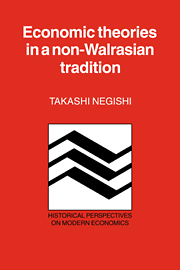Book contents
- Frontmatter
- Contents
- Preface
- 1 Anti-neoclassical or non-Walrasian economic theories
- Part I Increasing returns and diminishing cost
- Part II Wages and profit
- Part III International trade and investment
- 10 The role of exporters and importers in classical and Keynesian theories
- 11 Ricardo, the natural wage, and international unequal exchange
- Part IV Markets and money
- Notes
- References
- Author index
- Subject index
11 - Ricardo, the natural wage, and international unequal exchange
from Part III - International trade and investment
Published online by Cambridge University Press: 21 September 2009
- Frontmatter
- Contents
- Preface
- 1 Anti-neoclassical or non-Walrasian economic theories
- Part I Increasing returns and diminishing cost
- Part II Wages and profit
- Part III International trade and investment
- 10 The role of exporters and importers in classical and Keynesian theories
- 11 Ricardo, the natural wage, and international unequal exchange
- Part IV Markets and money
- Notes
- References
- Author index
- Subject index
Summary
The neoclassical theory of international trade presupposes given supplies of factors of production, including labor, and their international immobility. The price of a factor of production is then determined by its value productivity, which in turn depends on physical productivity and the price of the product. This can be clearly seen, for example, in arguments leading to the Stolper–Samuelson theorem that the price of a factor of production that is used relatively more intensively in the production of importables is increased by the imposition of an import tariff. In other words, the price of a factor of production as a quasi-rent is determined exclusively by the demand for it, since the supply is given by assumption.
The neoclassical interpretation of the Ricardian theory of international trade is, naturally, that it is a special case of the more general neoclassical theory, where the labor is the sole factor of production and the specialization is complete rather than incomplete.
In the simplest version of the Ricardian model commodities are exchanged for each other within a country according to the amounts of labor required to produce them. Labor is treated as the only factor of production requiring remuneration and it is assumed to be homogeneous in quality, so that wage rates in all occupations within the country are similar. Labor requirements per unit of output in the prevailing technology are assumed to be invariant with the scale of production.
(Caves and Jones 1973, p. 120)- Type
- Chapter
- Information
- Economic Theories in a Non-Walrasian Tradition , pp. 132 - 144Publisher: Cambridge University PressPrint publication year: 1985



